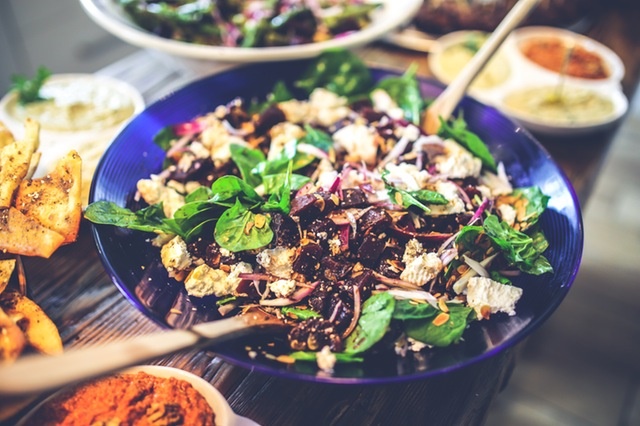The Six Principles of the Anti-Inflammatory Diet

You have regular, healthy meals, a lot of exercise and ample time to rest, but you still feel like something’s not right? If you often feel tired (despite sleeping 8 hours a day), if you suffer from headaches and muscle pain, if you catch too many infections and lack good humour, then it’s worth taking a series of laboratory tests. You can read more about individual tests, their meaning and interpretation on the Medline Plus website. It might turn out that you exhibit elevated C-reactive protein (CRP) concentration, which means that your organism is struggling with an inflammation.
Once serious illnesses are excluded (cancer, cardiac diseases, rheumatoid arthritis, infections, injuries), it’s not always possible to find the direct cause of the inflammation. An inflammation is often the result of bacteria, viruses or fungi entering the organism, and is a manifestation of the defensive reaction of the immune system. When that happens, it’s worth giving your diet a more in-depth look. The anti-inflammatory diet may help in this case. This diet is based on six basic principles:
- avoid simple sugars and saturated fats (primarily sweets, meat and meat products)
- give up processed foods and fast-food completely
- eating a lot of vegetables and fruits
- eat probiotic food daily
- eat products with omega-3 acids
- incorporate honey and certain types of mushrooms with anti-inflammatory effects into your diet
Substitute!
Simple sugars (primarily sweets and refined flour products) can be substituted with complex carbohydrates (whole-wheat flour products), while saturated fats (meat and meat products, butter) can be replaced with healthy vegetable fats, such as olive oil, avocado or nuts.
Vegetables can be consumed in unlimited amounts – the more colours and the greater diversity, the better. However, this rule doesn’t apply to fruits – despite their antioxidant properties, they contain a lot of fructose (a simple sugar) and eating them should be limited to two portions a day.
Probiotic Foods
Probiotic foods usually contain bacterial strains of the Lactobacillus type, which are beneficial for humans, particularly L. paracasei, L. acidophilus, L. rhamnosus, L. casei and L. johnsonii, as well as some strains of L. plantarum, and Bifidobacterium bifidum and Bifidobacterium longum. The anti-inflammatory diet should be tailored to the availability of products in a given region. In Europe, the most popular probiotic foods include pickled (cabbage, cucumbers) and fermented dairy products (for example kefir, buttermilk), whereas in Asia, apart from pickled products (the popular kimchi), the common probiotic foods include fermented soy and meat products.
The consumption of omega-3 acids (alpha-lipoic acid ALA, eicosapentaenoic acid EPA, docosahexaenoic acid DHA) reveals a number of benefits for the functioning of the heart and the brain as well as for skin appearance. It effectively inhibits all inflammations, for example in the case of acne or rheumatoid arthritis. These acids are typically present in saltwater fish (sardines, herring, mackerel, salmon) and seafood.
Anti-Inflammatory Mushrooms
The most commonly cited species of mushrooms with anti-inflammatory effects include:
- Hericium erinaceus,
- Agaricus subrufescens,
- Grifola frondosa,
- Phallus indusiatus,
- Cordyceps sinensis,
- Ganoderma lucidum.
These mushrooms are particularly popular in Asia, even though their prices can be exorbitant. You can read more about their applications on the website the conscious life . In Europe, it’s much easier to get hold of raw honey. Although you should also consume it in moderation given its high sugar content.
Scientists are trying to extract the strongest anti-inflammatory substances from plants in order to use them in medical practice in the form of medication or supplements. However, their potency is not always the same as when consuming the raw plant. This is a result of the lack of synergism. Which means that a given substance is not properly activated without the additional substances that are present in a plant. Hence, it’s worth supplying the anti-inflammatory substances with your food and not as a pill.
Composing a balanced anti-inflammatory diet on your own may appear complicated. If you have any doubts concerning your health and nutrition, it’s worth consulting a professional clinic, such as Double Check . You can sign up for an advanced series of laboratory tests at the clinic, while its nutrition and lifestyle specialists will compose a personalised diet for you.
When choosing meals for yourself and your loved ones, always keep the words of Hippocrates in mind:
“Let food be thy medicine and medicine be thy food.”
*****************
Azab A. et al., 2016, Anti-Inflammatory Activity of Natural Products
Georgousopoulou E. N., 2016, Anti-inflammatory diet and 10-year (2002–2012) cardiovascular disease incidence: The ATTICA study

